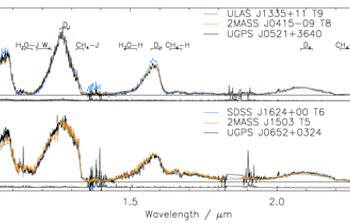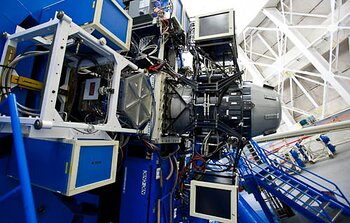Identifying Cool Brown Dwarfs With GNIRS
April 13, 2011

Brown dwarfs bridge the astronomical gap between stars (like the Sun) and planets (like Jupiter). Only during the last few years have enough cool brown dwarfs been discovered to begin to test the physical models that describe their atmospheric physics. Still, the population remains sufficiently small making the discovery of additional examples significant.
Ben Burningham (University of Hertfordshire, UK) and collaborators report the discovery of one late-type brown dwarf in the Monthly Notices of the Royal Astronomical Society. The team initially selected candidates based on their infrared colors in the UKIRT Infrared Deep Sky Survey Galactic Plane Survey. Spectroscopy obtained with the Gemini Near-Infrared Spectrograph (GNIRS) on the Gemini North telescope combined with photometry from the Spitzer Space Telescope enable the secure identification of its spectral type as T8.5. The authors conclude that the temperature of this object, UGPS J0521+3640, is between 600 to 650K, and it has a mass of about 14 to 32 MJup. Thus, it is another "barbeque-temperature" brown dwarf.
This new brown dwarf is relatively bright and located in the Galactic plane, so it is an excellent target for future studies. In particular, imaging with adaptive optics offers the possibility to search for faint, nearby substellar or planetary companions.

